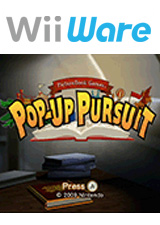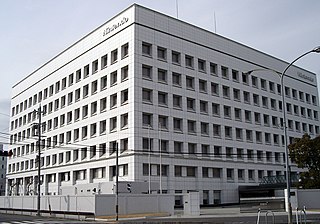
Donkey Kong Jr. is a 1982 platform video game by Nintendo. It is the sequel to Donkey Kong, which featured Mario as the hero and Junior's father as the villain; the roles are reversed here. It first appeared in arcades, and, over the course of the 1980s, was released for a variety of home platforms. The game's title is written out as Donkey Kong Junior in the North American arcade version and various ports to non-Nintendo systems.
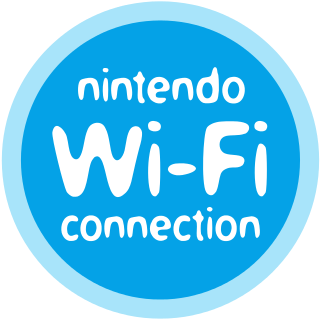
Nintendo Wi-Fi Connection was an online multiplayer gaming service run by Nintendo to provide free online play in compatible Nintendo DS and Wii games. The service included the company's Wii Shop Channel and DSi Shop game download services. It also ran features for the Wii and Nintendo DS systems.

Club Nintendo was the name of several publications and a better-known customer loyalty program provided by Nintendo. The loyalty program was free to join and provided rewards in exchange for consumer feedback and loyalty to purchasing official Nintendo products. Members of Club Nintendo earned credits or "coins" by submitting codes found on Nintendo products and systems, which could be traded in for special edition items only available on Club Nintendo. Rewards included objects such as playing cards, tote bags, controllers, downloadable content, and warranty extensions on select Nintendo products.
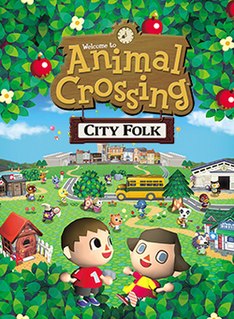
Animal Crossing: City Folk, known in Europe and Oceania as Animal Crossing: Let's Go to the City, is a 2008 life simulation video game developed and published by Nintendo for the Wii console and the third game in the Animal Crossing series. It is also one of the first titles that was re-released as a part of the Nintendo Selects collection in 2011.

Wii Sports is a 2006 sports video game developed and published by Nintendo for the Wii video game console. The game was released in North America along with the Wii on November 19, 2006, and was released in Japan, Australia, and Europe the following month. It was included as a pack-in game with the console in all territories except Japan and South Korea, making it the first sports game included with the launch of a Nintendo system since Mario's Tennis for the Virtual Boy in 1995. Wii Sports is available on its own as part of the Nintendo Selects collection of games.
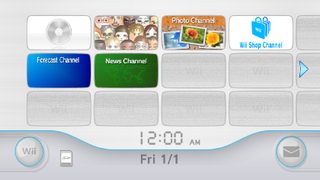
The Wii Menu is the graphical shell of the Wii game console, as part of the Wii system software. It has four pages, each with a 4:3 grid, and each displaying the current time and date. Available applications, known as "channels", are displayed and can be navigated using the pointer capability of the Wii Remote. The grid is customizable; users can move channels amongst the menu's 47 customizable slots by pressing and holding the A and B button while hovering over the channel the user wants to move. By pressing the plus and minus buttons on the Wii Remote users can scroll across accessing empty slots.
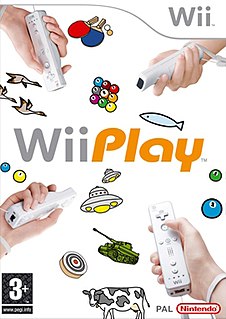
Wii Play, released as Your First Step to Wii in Japan, is a party video game developed and published by Nintendo for the Wii console. It was released as a launch game for the console in Japan, Europe, and Australia, and was released in North America in February 2007. The game features nine minigames, including a Duck Hunt-esque shooting range, a fishing game, and a billiards game, each of which are designed to showcase the features of the Wii Remote controller.

Wing Island (ウィングアイランド) is a flight simulator video game for the Wii. The game was developed by CAProduction and published in Japan and North America by Hudson Soft. It was published in Europe and Australia by Nintendo.
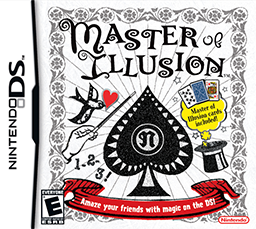
Master of Illusion, known in Europe as Magic Made Fun: Perform Tricks That Will Amaze Your Friends! and in Japan as Magic Encyclopedia, is a magician video game for the Nintendo DS. It was developed and published by Nintendo, released in Japan on November 16, 2006, November 26, 2007 in North America and March 14, 2008 in Europe. Around 9 of its magic tricks were released as separate pieces of DSiWare.

The Wii Shop Channel was an online shop for the Wii video game console that allowed users to download Virtual Console games, WiiWare games, and additional channels. The channel launched on December 10, 2006, and ceased operations on January 30, 2019. Available software was organized into three sections: Virtual Console, WiiWare, and Wii Channels. It is no longer possible to purchase content on the channel, but all previously purchased content can be redownloaded indefinitely as of February 2019. Upon its discontinuation, most software was removed from the channel, and the shop's interface reverted to its original design.

Mario Kart Wii is a racing video game developed and published by Nintendo for the Wii. It is the sixth installment in the Mario Kart series, and was released worldwide on April 27, 2008.

Pop is a WiiWare and iOS video game by Australian developer Nnooo. The game was released in North America on May 12, 2008 as a WiiWare launch title, and in Europe on July 4, 2008. It was released by Electronic Arts in Japan on July 29, 2008. The iOS version was released on the App Store on March 5, 2009. The game was also released for the DSiWare service under the title Pop+ Solo.

Family Table Tennis is a table tennis video game developed by Arc System Works for the Wii and Nintendo 3DS. It was released as a WiiWare launch title in Japan on March 25, 2008, and on May 26, 2008 in North America at a cost of 500 Wii Points. In the PAL regions, it was released on March 13, 2009 at a cost of 800 Wii Points.

Wii Sports Resort is a sports video game developed and published by Nintendo for the Wii video game console, and is a direct sequel to Wii Sports. It is one of the first titles to require the Wii MotionPlus accessory, which was bundled with the game. Wii Sports Resort was first announced at E3 2008 and was released in Japan on June 25, 2009 and in nearly all other regions in the following month. While the game was originally released only as a stand-alone title, as of 2009 the game was bundled with newer Wii consoles, along with Wii Sports.

Pokémon Rumble is a beat 'em up video game in the Pokémon series for WiiWare.

3-2-1, Rattle Battle!, known in Japan as Atsui 12 Game: Furi Furi Party!, is a video game for WiiWare developed by Tecmo. It was released in Japan on March 31, 2009, the PAL regions on August 14, 2009 and in North America on August 31, 2009.

PictureBook Games: The Royal Bluff is a party video game developed by Japanese studio Grounding Inc and published by Nintendo for the Nintendo DSi's DSiWare download service. It was released on September 16, 2009 in Japan, on October 26, 2009 in North America and in the PAL regions on November 12, 2009, for 500 Nintendo Points points.

Wii Party is a party video game developed and published by Nintendo for the Wii video game console. The game heavily borrows game play elements from the Mario Party series, another Nintendo franchise. It is also the first game in the Wii series that Shigeru Miyamoto did not produce. The game was released in Japan on July 8, 2010, in North America on October 3, 2010, in Australia on October 7, 2010, and in Europe on October 8, 2010. Wii Party was revealed by Satoru Iwata in a Financial Results Briefing on May 7, 2010. It received mixed reviews from critics and sold 9.33 million copies worldwide as of March 2019. A sequel, Wii Party U, was released for the Wii U on October 25, 2013.

Kirby's Return to Dream Land, released in Europe and Australia as Kirby's Adventure Wii, is a Kirby video game and the twelfth platform installment of the series, developed by HAL Laboratory, and published by Nintendo. While Kirby's Epic Yarn was released in 2010, Kirby's Return to Dream Land is the first traditional Kirby platforming home console game since Kirby 64: The Crystal Shards, which was released in 2000 for the Nintendo 64. The title was released in North America on October 24, 2011, in Japan on October 27, 2011, in Europe on November 25, 2011, and in Australia on December 1, 2011.
